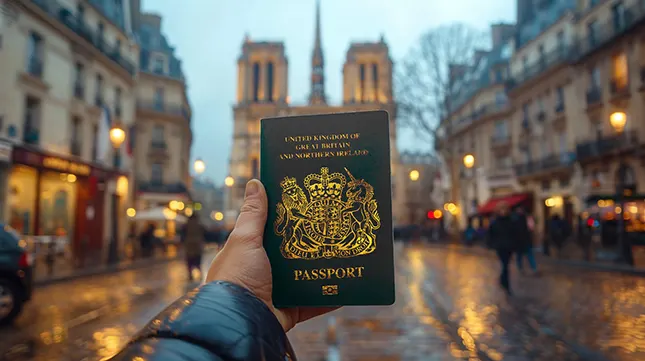Moving to France from the UK offers an exciting opportunity to immerse yourself in a rich tapestry of culture, cuisine, and scenic beauty.
Whether you’re drawn to the vibrant life of Paris, the serene landscapes of Provence, or the coastal charm of Brittany, relocating to France is a venture that promises new experiences and a change of pace.
Additionally, the proximity to the UK allows for convenient visits from family and friends via road, rail, and air, helping to keep homesickness at bay.
However, post-Brexit, moving to France requires careful planning and an understanding of new regulations.
This comprehensive guide provides insights to ensure a smooth transition from the UK to France and outlines what to expect upon arrival.
Understanding Post-Brexit Regulations

With the UK’s departure from the European Union, British citizens no longer enjoy the freedom of movement previously afforded to EU members.
This change necessitates obtaining the appropriate visas and residence permits to live and work in France.
The good news is that there are numerous visa options available to suit various circumstances.
Various Visa Requirements
It’s essential to allow yourself plenty of time to arrange the correct visa. Here are the main options:
- Short Stays (Up to 90 Days): UK nationals can visit France without a visa for tourism or business purposes for up to 90 days within a 180-day period.
- Long Stays (Over 90 Days): For stays exceeding 90 days, a long-stay visa (visa de long séjour) is mandatory. The type of visa depends on your purpose, such as work, study, or family reunification. Detailed information and application procedures are available on the official French government website.
Residence Permits
After arriving in France with a long-stay visa, you must apply for a residence permit (titre de séjour) to extend your stay beyond the visa’s validity.
This process involves registering with the local prefecture and may require proof of income, health insurance, and accommodation. More details can be found on the French government’s official website.
Having the correct visa before arriving in France is crucial to ensure a smooth and legal transition.
Without the appropriate documentation, you may face entry denial, legal issues, or difficulties accessing essential services like healthcare and banking.
Proper preparation prevents delays, fines, or even deportation, ensuring a hassle-free move.
Mastering the French Language
Learning French is one of expats’ biggest challenges when moving to France.
Many who struggle with the language find it difficult to settle in long-term.
While basic phrases may suffice for a short trip, daily life requires more fluency, especially when handling essentials like medical appointments, banking, and shopping.
Fortunately, French is one of the easier languages for English speakers to learn, thanks to shared vocabulary and similar grammar structures.
Starting before you move is ideal, but many expats recommend learning as you go to pick up natural, conversational French.
Larger towns and cities offer free or low-cost French classes for newcomers, providing a great way to learn while connecting with other expats.
Online platforms like Babbel and Lingoda also offer flexible, interactive courses.
Locals appreciate any effort to speak French, making it easier to integrate into your new community.
Financial Considerations
Your French journey cannot happen without time spent arranging and ensuring you have enough money to fund it.
Understanding the financial implications of your move will make it easier for you on a number of levels.
A stable financial plan also helps meet visa requirements, as proof of income or savings is often needed.
Additionally, understanding the cost of living, tax obligations, and exchange rates will prevent financial stress and help you establish a secure future in France.
Cost of Living

The cost of living in France varies by region. Major cities like Paris tend to be more expensive, while rural areas offer a more affordable lifestyle, similar to the UK.
Here’s a cost comparison to give you an idea of what to expect from your day-to-day expenses:
- Utilities: Electricity, heating, cooling, water, and rubbish disposal average around €150 (£126) per month for an 85-square-metre apartment, which is just over half the price compared to the UK.
- Rent: A one-bedroom apartment in Paris averages around €1,063 (£893), while the outskirts of the city see a drop in costs to around €509 (£427) per month, a significant saving.
- Groceries and Dining Out: A meal at an inexpensive restaurant might cost €15 (£12.60) compared to £17 (€20.23) in the UK. A mid-range restaurant for two could total around €60 (£50) compared to £65 (€77) in the UK. Most grocery prices are fairly comparable, with a litre of milk costing about €1.15 (£0.97), a loaf of bread €1.50 (£1.48), and a dozen eggs approximately €3.50 (£3.15).
- Transportation: Most cities offer extensive public transport networks, and a monthly public transport pass costs about €75 in Paris, which is significantly less than in London, which is approximately 50% more expensive.
Overall, while some areas in France, particularly urban centres, can be expensive, many regions offer a lower cost of living compared to the UK.
This is even more noticeable in rural areas, which provide more affordable housing and everyday expenses, making them attractive options for expats looking to stretch their budgets while enjoying the French lifestyle.
All statistics are taken from Numbeo, the cost-of-living website; be sure to check it out for even more helpful insights!
Banking and Taxes

Opening a French bank account will make paying bills and receiving salaries more straightforward.
You’ll typically need proof of identity, address, and employment or income to open an account.
Major French banks such as Crédit Agricole, BNP Paribas, and Société Générale provide dedicated services for expats, including international banking and extensive online facilities.
You should also familiarise yourself with France’s tax system, as residents are taxed on worldwide income.
Consider consulting a bilingual financial advisor who can offer personalised guidance to help you navigate your obligations; firms like Russell Cooke are highly recommended.
Maximising Your Exchange Rate
Securing a favourable exchange rate when moving money from the UK to France is crucial, especially if you plan to buy property or transfer significant savings.
Small fluctuations can notably impact your budget, so monitoring rates closely is beneficial.
Trusted sources such as Currencies Direct or the Bank of England provide reliable, real-time data and often better exchange rates compared to traditional banks.
Planning your currency exchanges strategically can help maximise your finances, easing your financial transition when moving to France.
Finding Work in France as a UK Expat

If employment is part of your relocation plan, securing the correct visa and residence permit is essential.
Post-Brexit, UK nationals typically require a long-stay work visa, such as the Visa de Long Séjour valant Titre de Séjour – Salarié for salaried positions or an Entrepreneur/Profession Libérale visa for self-employed individuals.
Securing employment before relocating can simplify the emigration process significantly, as employers may offer assistance with visas, healthcare registration, and schooling for your children.
If you intend to job hunt after arriving, speaking French fluently will greatly enhance your opportunities.
Resources like Expatica and Campus France offer excellent guidance for finding job opportunities and advice on tailoring your CV to French standards.
Essential ID Numbers for Working in France
Upon commencing work in France, you’ll receive two key identification numbers:
- SPI (Tax Identification Number) – Issued by French tax authorities to track your tax contributions.
- INSEE (Social Security Number) – Essential for accessing healthcare, unemployment benefits, and pension schemes.
Applying for these promptly upon employment ensures smoother integration into France’s systems.
Understanding French Workplace Culture

France maintains a structured workplace culture, emphasising professionalism, punctuality, and respect for hierarchy. A standard workweek is typically 35 hours, with generous leave allowances—often five weeks per year.
Lunchtime can extend up to two hours, and legally, workers cannot eat at their desks.
Adapting quickly to workplace etiquette and relationship-building will help you integrate and succeed professionally in France.
France’s Diverse Climate: What to Expect

France covers approximately 248,600 square miles, offering varied climates:
- Northern Regions and Paris: Cooler winters (~3°C) and mild summers (~25°C).
- Southern France: Mediterranean climate with hot summers (>30°C) and mild winters.
- Mountainous Regions (Alps/Pyrenees): Cold winters and heavy snowfall, ideal for winter sports enthusiasts.
Check local weather patterns via Météo, France, to prepare adequately for your move.
Accessing Healthcare in France

France offers one of the world’s leading healthcare systems.
It is vital to register for French health insurance (Protection Universelle Maladie—PUMa) within three months.
Until your public insurance becomes active, private healthcare providers like Bupa or TopExpat Insurance can ensure you’re covered.
France’s healthcare system provides efficient and accessible care, making it highly regarded among expats.
Education Options for Families in France

France’s education system offers high-quality, compulsory schooling from ages 3 to 16, structured as follows:
- École Maternelle (Preschool, 3-6 years)
- École Élémentaire (Primary, 6-11 years)
- Collège (Middle school, 11-15 years)
- Lycée (Secondary school, 15-18 years)
International schools such as the British School of Paris cater specifically to expat families.
Investing in French Property

The French property market offers diverse opportunities, from high-value urban apartments to affordable countryside homes. Prices vary dramatically—from around €10,000 per square metre in Paris to as low as €888 per square metre in rural regions like Haute-Vienne.
Consider renting initially to explore regions before buying. Trusted platforms like French-Property.com and Rightmove are ideal starting points for property searches.
Driving in France as a UK Expat

UK driving licences must be exchanged for a French licence within 12 months of residency.
Applications can be made via the official government platform, ANTS.
Ensure compliance with French driving regulations, such as carrying mandatory equipment (breathalyser kits, reflective jackets, warning triangles), adhering to strict speed limits, and being mindful of motorway tolls (péages). Check Autoroutes.fr for detailed route and cost information.
Relocating Pets to France

Bringing pets to France requires careful preparation due to strict post-Brexit regulations:
- Pets must have a microchip, rabies vaccination, and an Animal Health Certificate (AHC).
- Check specific requirements if transiting through other European countries.
Specialist companies like Pet Air simplify the process, ensuring minimal stress for your animals.
Transporting Your Belongings to France with R.H. Pardy Removals

Choosing a trusted removals company is essential for a smooth move.
At R.H. Pardy Removals, we specialise in seamless international moves, offering tailored services to meet your unique requirements.
Our professional team handles every aspect, from secure packing and transportation to customs clearance and delivery at your new home.
Decluttering beforehand can reduce costs and simplify your move.
Storage Solutions During Your Move

If you need flexible storage options during your relocation, R.H. Pardy Removals offers secure, temperature-controlled storage facilities, ideal for short- or long-term solutions, giving you complete peace of mind throughout your move.
Embracing French Culture and Integration
Adjusting to French life extends beyond practical matters; integrating culturally enriches your experience. Participate in local community events, embrace the slower pace, and enjoy France’s renowned gastronomy. The transition will be easier if you immerse yourself fully in your new surroundings.
Begin Your Move to France with Confidence
Relocating internationally may seem daunting, but partnering with R.H. Pardy Removals means choosing expertise, reliability, and personalised service. To start your exciting new chapter in France, request a no-obligation quote today or call our friendly team to discuss how we can help make your move as stress-free and enjoyable as possible.





